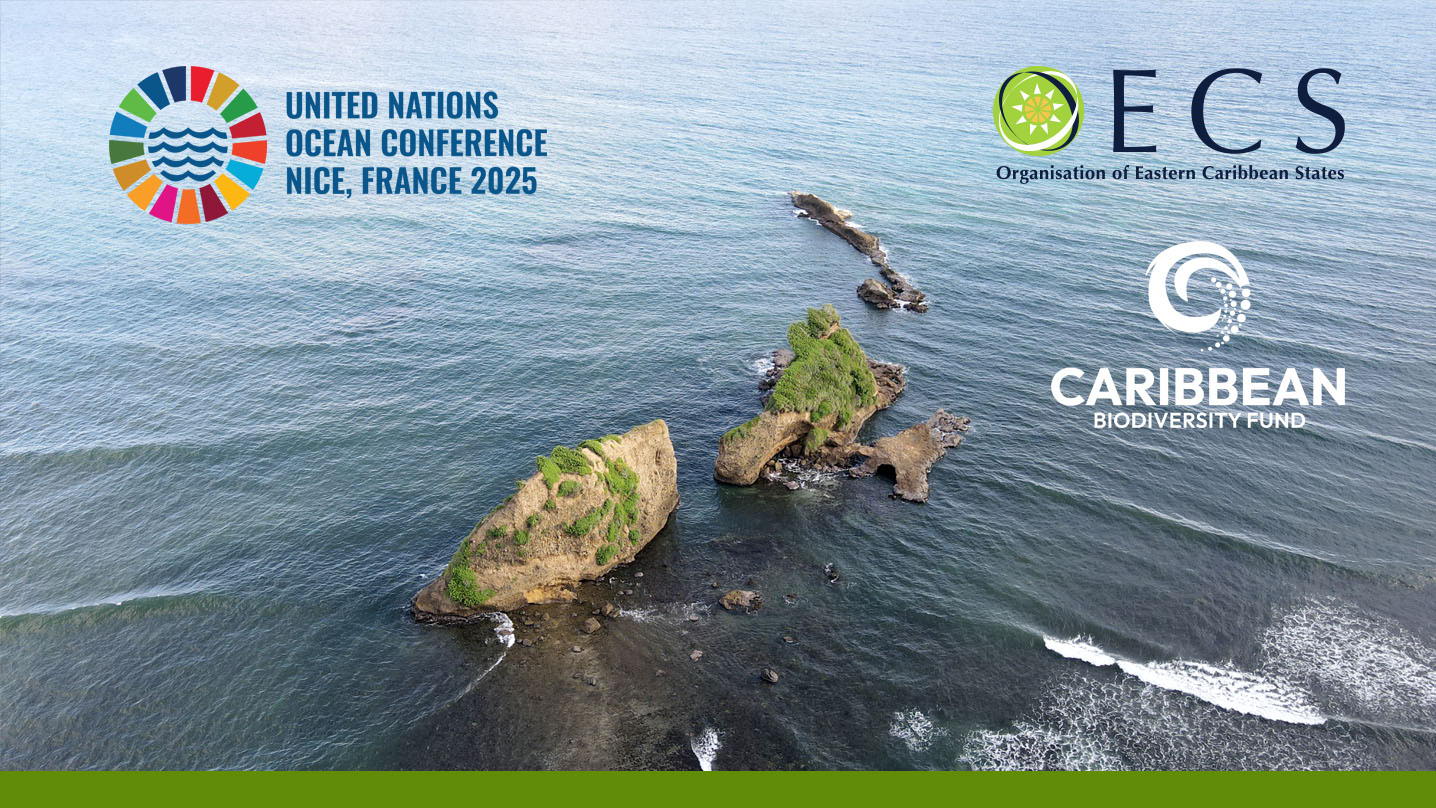A United Caribbean Voice for the Ocean: OECS Member States and CBF to Amplify Regional Action at UNOC-3
Joint Press Release: OECS and the Caribbean Biodiversity Fund
For Caribbean people, the ocean is more than a resource—it is central to our identity, our food systems, our economies, and our way of life. It sustains cultures, drives livelihoods, and links generations through shared history and stewardship.
Yet, the Caribbean Sea faces mounting threats. Climate change, biodiversity loss, marine pollution, and overexploitation are intensifying, jeopardising both ecosystems and communities. These challenges do not recognise borders. They demand unified, science-based action from governments working together.
At the 3rd United Nations Ocean Conference (UNOC3), being held in Nice, France from June 9–13, 2025, the Organisation of Eastern Caribbean States (OECS) Member States, represented by the OECS Commission, will join with the Caribbean Biodiversity Fund (CBF) to present a coordinated regional response that links political commitment with financing and results.
UNOC3, co-hosted by France and Costa Rica, will bring global leaders together under the theme “Scaling up Ocean Action Based on Science and Innovation for the Implementation of Goal 14: An Ocean for Sustainable Development.”
Caribbean Governments Advancing Ocean Commitments
Caribbean governments are demonstrating that regional cooperation is key to protecting 30% of marine and coastal areas by 2030, in line with SDG 14 and the Kunming-Montreal Global Biodiversity Framework.
At the center of their engagement at UNOC3 is the global launch of the Actioning Blue: Caribbean 30x30 Vision for the Ocean—a political declaration developed by a High-Level Policy Working Group and endorsed at the recent OECS Council of Ministers for Environmental Sustainability (COMES 12) held in Antigua and Barbuda.
This initiative strengthens intergovernmental coordination through a newly formed Ocean Coordination Mechanism, hosted by the Government of Grenada, and supported by 18 countries and 9 intergovernmental organizations. These political and technical frameworks reflect a growing movement to build collective capacity, align national efforts, and scale science-based implementation across borders.
From Policy to Practice
To drive action beyond declarations, the Caribbean is also pioneering innovative financing through the Caribbean Sustainable Finance Architecture, coordinated by the CBF. Through this mechanism and others, over US$33 million has been deployed— not simply to fund projects, but to deliver long-term results that are aligned to the 30x30 Vision for the Ocean, to ensure that both the region’s people and nature thrive.
This financing has enabled the expansion of marine protected areas, the strengthening of biodiversity conservation policies, and the implementation of locally led climate adaptation efforts in 12 countries. By aligning financial flows with national and regional goals, this approach is helping Caribbean states deliver on international targets while empowering communities.
Aligning with UNOC3 Priorities
The Caribbean delegation will participate in several high-level sessions during UNOC3 that reflect the conference’s core pillars: science-based decision-making, innovative partnerships, and scaled financing.
These events including the global launch of Actioning Blue, and panels on ocean coordination and sustainable finance are not standalone moments, but part of a strategic effort to catalyze commitments, amplify Caribbean leadership, and secure investment in ocean health.
As the global community works to secure a healthy, resilient ocean, Caribbean nations will be at the table united, prepared, and speaking with one voice.
About the OECS
The Organisation of Eastern Caribbean States (OECS) was established on June 18, 1981, when seven Eastern Caribbean countries signed the Treaty of Basseterre, named after the capital city of St. Kitts and Nevis, where the agreement was signed. This treaty marked a commitment to promote cooperation, unity, and solidarity among the Member States. The Protocol Member States of the OECS are: Antigua and Barbuda, the Commonwealth of Dominica, Grenada, Montserrat, St. Kitts and Nevis, Saint Lucia, and St. Vincent and the Grenadines. The British Virgin Islands, Anguilla, Martinique, Guadeloupe, and Saint Martin are Associate Member States.’
About the Caribbean Biodiversity Fund
The Caribbean Biodiversity Fund (CBF) is a regional umbrella environmental fund that uses a flexible structure to implement innovative solutions and consolidate resource mobilization in the Caribbean through a range of financial instruments. Working towards the vision of a Caribbean region where both its natural environment and people thrive, the organization measures total assets under management, annual return on investments, competency improvements, and global initiatives as the key performance indicators that directly contribute to its mission. Currently, the CBF has 3 programs, the Conservation Finance Program, based on an endowment fund, Climate Change Program, focused on Ecosystem-based Adaptation (EbA) strategies, and Nature-based Economies Program with an Advancing Circular Economy focus. To date, the CBF has provided financing for more than 100 projects across the Caribbean, valued at over US$30 million, demonstrating a significant commitment to the preservation of the region’s biodiversity.
Danny Moonie
Renée Smith
OECS Communications Unit
